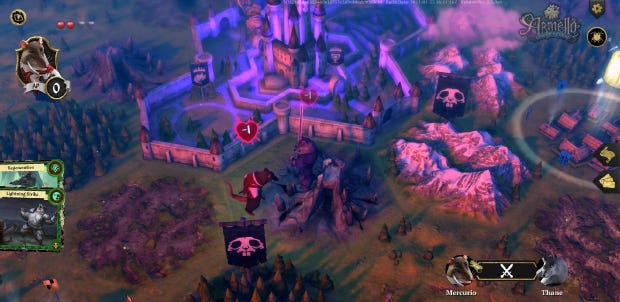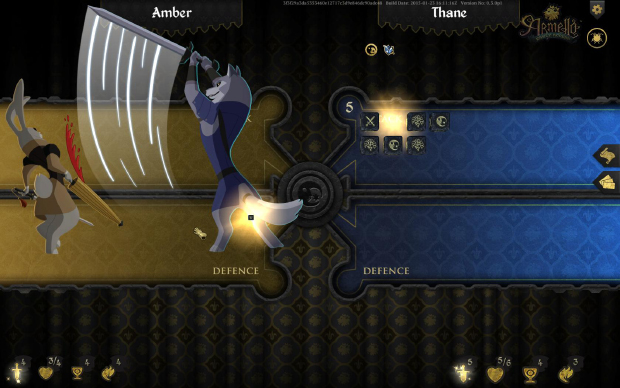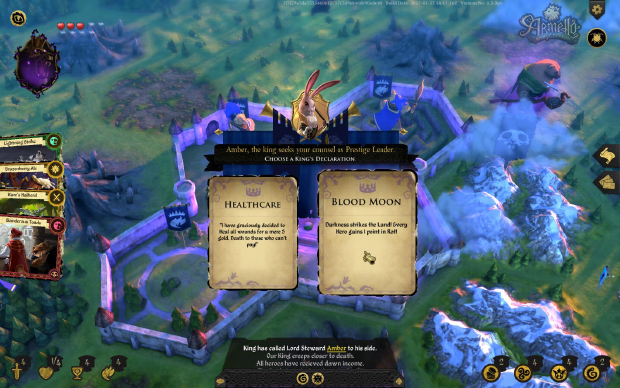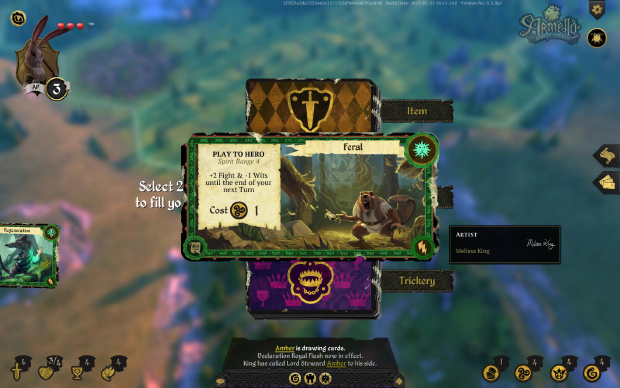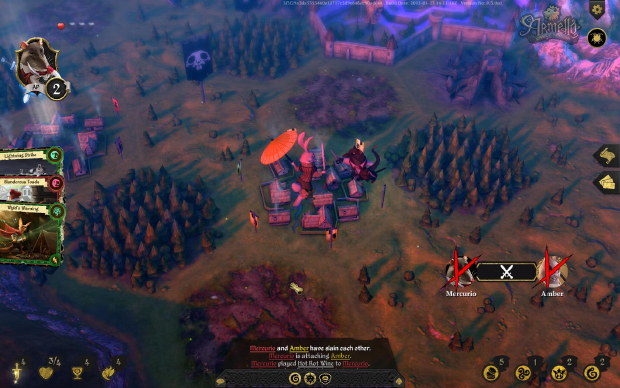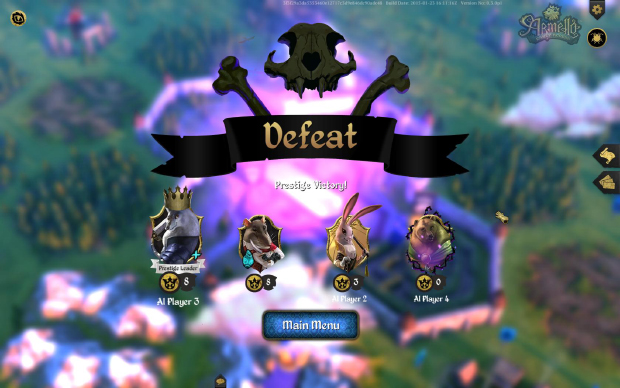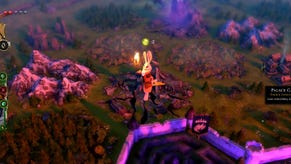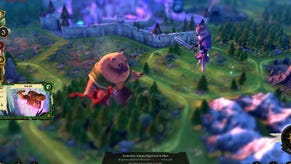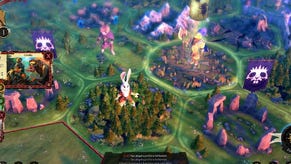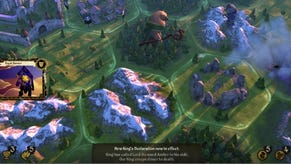Premature Evaluation: Armello
Animal Crossing
Each week Marsh Davies sidles into the shadowy world of intrigue that is Early Access and comes back with any stories he can find and/or a knife in the back. This week, he plugs in his bunny tail and assassinates anthropomorphised animals with an umbrella in Armello, a digital boardgame of machiavellian power plays.
It would take an Australian developer, apparently not content with harbouring the most deadly creatures on the planet, to advocate giving swords to wolves. Real nice, Australia. Real nice. Why not put stilettos into the tiny claws of rats, while you’re at it? How about making bears into deadly wizards? Go on, give rabbits concealed blades disguised as parasols, why don’t you?
Then make them fight. Oh, you did? Oh.
In the Game of Thrones of Farthing Wood, you win or… well, it’s not clear what happens to other players. But given the number of poisonings, sword fights and executions that occur in the course of Armello, we can assume it’s not good.
Up to four weaponised animals, controlled by players or AI, tussle for supremacy over this exceedingly beautiful hex-based fantasy land. All hope to succeed or usurp the mad, dying king who rules from the palace at its centre. After every two rounds - one during the day, the other at night - the netherwordly pestilence known as The Rot takes another bite out of his health. In 16 rounds, he will be dead, passing the crown to the player with the most prestige. And so players scurry over the mountains and through the bogs of Armello, doing adventurous deeds, claiming towns to keep their coffers full, delving into dungeons to obtain riches or items and laying deadly traps for their competitors.
But prestige is not the only route to victory: you can challenge the king directly, battling through a succession of tough trials to face him in combat. You can convene with druids and spirits to harness the land’s magic and banish him. You can surrender yourself to the corruption which has demented him, becoming an even greater monster than he. Or - my preference - you can wait in the shadows while everyone else sticks daggers into each other, and then step out with a polite cough when the dust settles.
These options are further complicated by fatal fisticuffs between asymmetrically talented player-characters, who are empowered at different stages of the game’s day-night cycle. Then there are land grabs, traps, rings, inventories, spells, followers, monsters, and the king’s own maniacal edicts. These last can be mediated by the player with highest prestige, picking between two policy options each dawn, in the hopes of benefiting their own clan, or, as is more often the case, hurting them least. Suddenly, perhaps, all players are declared traitors and hunted by the palace guard - an option best chosen from a safe distance. Alternatively, a wealthy player might persuade the king to levy a tax, summarily executing those whose pockets prove empty. It has the effect of energising the game, forcing players to react and remake their plans.
The card system is also rather neat - and not just because the artwork on every card is so beautifully drawn and subtly animated. Each turn you refill your hand from three different decks: Items can be guzzled for immediate but temporary effect, or equipped to permanently boost your stats; Spells allow you to buff yourself or bring down terrible magic upon your foes; Trickery cards can be dropped onto any hex to create a dangerous test for other characters that they must resolve. Many cards can be used at any time, even during other characters' turns. Here’s the thing though: they can also be burnt during combat to guarantee one of your die rolls, forcing you to shed your hoarded goodies or powerful spells to escape a scrape. Confusingly, however, their function often changes from day to night, and depending on your character’s status.
There’s a lot going on in Armello. So much so that the developers say it takes two GMs to run the paper prototype of the game. I can well believe it. And yet, while Armello’s computer brain helps to quickly calculate the complicated buffs, debuffs and dice rolls, I’m not sure it’s always that good at articulating exactly what’s going on. I’ll saunter into combat having stacked a bunch of buffs and kitted out with sharp, pointy items, and find - after an unintelligible flurry of events - my opponent has reduced the number of dice I can roll to one. Cards played against you burn off screen before you’ve had even the slightest chance to ingest their text. It’s hard to learn much from this.
Digitalisation of card games and boardgames has allowed them to wrest the weight of number crunching from the players’ shoulders, but Armello occasionally conceals too much in its hurry to reach results. At other times it preserves cumbersome aspects of boardgame physicality; they may feel gratifyingly tactile, but dice with esoteric symbology, whose meaning continually changes, manage to make opaque what To-Hit percentages have long-since clarified. Ultimately this digitalised/physicalised game feels neither fish nor fowl (notwithstanding the possibility of a clan of anthropomorphised nautical chickens being added as DLC).
But such are the reasons why it is to be in Early Access for the next six months, and the devs seem sanguine about the prospect of radically reworking the game during that time - not just the interface and its translation of physical to digital, but of the balance and the fundamentals of its mid-to-late game. It feels very complete right now in terms of basic functionality, but its mechanics don’t quite allow strategy to blossom in the way the varied win conditions suggest they should.
For one thing anything but a prestige victory is prohibitively difficult to achieve, it seems. My feeling is that this is because everyone has such a low health pool, and so many means of dying, that it encourages relatively conservative play. Even the toughest player-character, the sword-wielding wolf prince, can be felled in a single unlucky combat with any other creature. Bog tiles take a point off your health when you move onto them. Other players can poison you, devouring your health with every movement. The Rot can permanently disease you, too, and drain your life. Getting from one side of the map to the other, to collect items or complete quests, is an unlikely gamble with only four or so points of health - die, and you’ll respawn at your starting location, minus a precious prestige point.
The result is that players tend to mill around the same selection of tiles, grinding prestige or items from the same dungeons, hoping to ensnare enemies in traps and occasionally scuffling at the borders of their territory. The idea that you might venture the length and breadth of Armello to attain all the Spirit Stones required for a magic win, or beef yourself up enough to clobber the King, seems somewhat unrealistic.
None of which is to say it’s far off coalescing into a strategically rich game where such things are possible. I’d like to see how the game plays out if you double, or even triple, everyone’s health pool. Failing combat would be a significant inconvenience to your overall plan, but not so frequently fatal for one or the other party. Death in Armello currently serves little purpose but to stagnate everyone’s agency. With a larger health pool you wouldn’t constantly be reset to your starting location, but could roam the map more brazenly, risking injury in dungeons, or crossing bogland. Weak characters who want to specialise outside of combat could do with some more significant defensive options, too: perhaps allowing them to fortify their position at the cost of an action point.
Since I’m spitballing here: given how tricky it is to remember all the buffs in play, perhaps the game might offer a crude percentage chance of victory before committing to combat. I’m tempted to think it might be worth rebalancing the game to allow players to permanently build their stats beyond their base level. Currently your mana pool resets every night, and this only closes down options for players, particularly Mercurio, the mana-weak rat. Maybe the idea is to prevent players from hoarding mana and unleashing an eldritch apocalypse in the later game - but I’m not sure that should be an entirely forbidden strategy.
Of course, I expect the devs have been thinking about this game for quite a bit longer than I have and could come up with a long list of reasons why things are the way they are. All the same, there is definitely something throttling the potential of Armello to be a good deal more dynamic and exciting than it is, even if I’ve failed to pinpoint that flaw. But if the devs’ design chops are on par with their artistic and musical talents, six months should be time enough to find it.
Armello is available from Steam for £19 (although it’s going for £15.19 up until January 29). I played version 0.3.0p1 on 24/01/2015.
